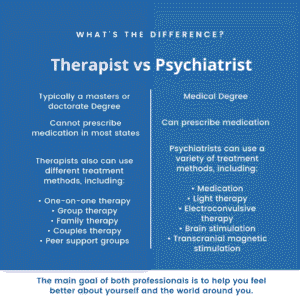What is a Psychologist?

Psychologists typically have doctoral degrees and can conduct psychological testing and assessments
A psychologist is a mental health professional who has earned a doctoral degree (Ph.D. or Psy.D.) in psychology. These professionals study human behavior and mental processes through scientific research and clinical practice. Psychologists undergo extensive education and training, typically requiring 8-10 years of post-secondary education.
Licensed psychologists are qualified to assess, diagnose, and treat a wide range of mental health disorders. They use various evidence-based therapeutic approaches and can administer psychological tests to evaluate cognitive functioning, personality traits, and mental health conditions.
Education and Licensing Requirements
Becoming a licensed psychologist involves rigorous academic and clinical training:
- Bachelor’s degree (4 years)
- Doctoral degree in psychology (4-7 years)
- 1-2 years of supervised clinical experience
- Passing the Examination for Professional Practice in Psychology (EPPP)
- State licensure requirements (varies by location)
This extensive training equips psychologists with advanced knowledge of psychological theory, research methods, and clinical interventions. The total time to become a licensed psychologist typically ranges from 10-13 years after high school.
Common Issues Addressed by Psychologists
Psychologists are trained to address complex mental health conditions and often work with clients experiencing:
- Clinical depression and anxiety disorders
- Bipolar disorder and schizophrenia
- Post-traumatic stress disorder (PTSD)
- Personality disorders
- Learning disabilities and ADHD
- Substance use disorders
- Eating disorders
- Behavioral problems
What is a Therapist?

Therapists often create comfortable environments focused on talk therapy and emotional support
A therapist is a broader term that encompasses various mental health professionals who provide talk therapy and counseling services. Therapists typically hold at least a master’s degree in fields such as counseling, marriage and family therapy, social work, or psychology.
Licensed therapists help clients address emotional challenges, behavioral issues, and relationship problems. They focus on providing support, guidance, and practical strategies to improve mental well-being and cope with life’s difficulties.
Education and Licensing Requirements
The path to becoming a therapist generally includes:
- Bachelor’s degree (4 years)
- Master’s degree in counseling, therapy, or related field (2-3 years)
- 1,500-3,000 hours of supervised clinical experience
- Passing a state licensing exam
- Continuing education to maintain licensure
The total time to become a licensed therapist typically ranges from 7-9 years after high school. Common therapist credentials include Licensed Mental Health Counselor (LMHC), Licensed Professional Counselor (LPC), and Licensed Marriage and Family Therapist (LMFT).
Common Issues Addressed by Therapists
Therapists often work with clients dealing with:
- Relationship and family conflicts
- Grief and loss
- Life transitions and adjustments
- Stress management
- Mild to moderate depression and anxiety
- Self-esteem issues
- Work-related challenges
- Personal growth and development
5 Key Differences Between Psychologists and Therapists

Psychologists and therapists differ in their education, approach, and treatment settings
Understanding the distinctions between psychologists and therapists can help you determine which professional might best meet your needs. Here are five key differences:
1. Education and Training
The most significant difference between psychologists and therapists lies in their educational requirements:
Psychologists
- Doctoral degree (Ph.D. or Psy.D.)
- 5-7 years of graduate education
- Extensive research training
- 1-2 years of post-doctoral supervised experience
Therapists
- Master’s degree
- 2-3 years of graduate education
- Focus on clinical application
- 1,500-3,000 hours of supervised experience
2. Licensing and Credentials
Both professionals require licensing, but the specific requirements and titles differ:
Psychologist Licensing
- Licensed Clinical Psychologist
- Requires passing the EPPP exam
- Can use the title “Psychologist”
- License regulated by state psychology boards
Therapist Licensing
- Various titles: LMHC, LPC, LMFT, LCSW
- State-specific licensing exams
- Cannot use the title “Psychologist”
- License regulated by state counseling boards
3. Scope of Practice


Psychologists and therapists have different capabilities within their professional roles:
Psychologists Can:
- Administer and interpret psychological tests
- Diagnose complex mental health disorders
- Conduct research and publish findings
- Provide expert testimony in court
- Treat severe mental health conditions
Therapists Can:
- Provide talk therapy and counseling
- Address relationship and family issues
- Help with life transitions and adjustments
- Offer practical coping strategies
- Treat mild to moderate conditions
4. Treatment Methods
The approaches to treatment often differ between these professionals:
Psychologist Approaches
- Evidence-based psychological interventions
- Cognitive-behavioral therapy (CBT)
- Psychological testing and assessment
- Neuropsychological evaluation
- Research-informed treatments
Therapist Approaches
- Solution-focused brief therapy
- Humanistic and client-centered approaches
- Marriage and family therapy techniques
- Mindfulness and stress reduction
- Practical skill-building
5. Work Settings
Psychologists and therapists often work in different environments:
Psychologist Settings
- Hospitals and medical centers
- Research institutions
- Universities and academic settings
- Private practices
- Government agencies
Therapist Settings
- Community mental health centers
- Private practices
- Schools and colleges
- Nonprofit organizations
- Corporate wellness programs
Psychologist vs Therapist: Side-by-Side Comparison
| Characteristic | Psychologist | Therapist |
| Education | Doctoral degree (Ph.D. or Psy.D.) | Master’s degree |
| Time to Licensure | 10-13 years | 7-9 years |
| Can Diagnose Mental Disorders | Yes, including complex conditions | Yes, typically less complex conditions |
| Can Conduct Psychological Testing | Yes | Limited or No |
| Can Prescribe Medication | No (except in some states with additional training) | No |
| Treatment Focus | Assessment, diagnosis, and treatment of mental disorders | Emotional support, coping strategies, and personal growth |
| Typical Session Length | 45-60 minutes | 45-60 minutes |
| Average Cost Per Session | $100-$200 | $80-$150 |
Assess Your Mental Health Needs
Not sure which professional is right for you? Take our quick assessment to get personalized guidance.
When to See a Psychologist vs a Therapist

Choosing the right mental health professional depends on your specific needs and circumstances
Deciding whether to see a psychologist or therapist depends on your specific mental health needs, the severity of your symptoms, and your treatment goals. Here’s guidance on when each professional might be more appropriate:
When to Consider a Psychologist

A psychologist might be the better choice if you:
- Need a comprehensive psychological assessment – If you require formal testing to diagnose conditions like ADHD, learning disabilities, or neuropsychological issues
- Have complex or severe mental health conditions – Such as bipolar disorder, severe depression, schizophrenia, or personality disorders
- Haven’t responded to previous therapy attempts – When standard therapeutic approaches haven’t been effective
- Need specialized treatment approaches – For specific conditions that require evidence-based interventions
- Require documentation for legal purposes – Such as disability claims, court proceedings, or educational accommodations
When to Consider a Therapist

A therapist might be more appropriate if you:
- Need support for life transitions or stress – Such as career changes, relationship issues, or grief
- Want to improve coping skills – For managing everyday challenges and emotions
- Have relationship or family concerns – Including marital problems, parenting challenges, or family conflicts
- Experience mild to moderate anxiety or depression – That doesn’t significantly impair daily functioning
- Seek personal growth and self-improvement – Rather than treatment for a specific mental health condition
Important Note: If you’re experiencing thoughts of harming yourself or others, seek immediate help by calling the National Suicide Prevention Lifeline at 988 or going to your nearest emergency room. These situations require immediate attention regardless of provider type.
How to Choose Between a Psychologist and Therapist

Taking time to research and consider your options can help you find the right mental health professional
Finding the right mental health professional is a personal decision. Here are practical steps to help you choose between a psychologist and therapist:
Step 1: Identify Your Specific Needs
Begin by clarifying what you hope to address through mental health services:
- Are you seeking help for a specific mental health condition or diagnosis?
- Do you need psychological testing or assessment?
- Are you dealing with relationship issues or life transitions?
- How severe are your symptoms, and how much do they impact your daily life?
Step 2: Consider Practical Factors

Several practical considerations may influence your decision:
- Insurance coverage – Check which provider types are covered by your insurance plan
- Cost – Psychologists typically charge more than therapists due to their higher level of education
- Availability – Consider wait times for appointments and session frequency
- Location and format – In-person vs. telehealth options
Step 3: Research Potential Providers
Once you’ve narrowed down your options, research specific providers:
- Check credentials, specializations, and experience
- Read reviews and testimonials from other clients
- Visit their websites to learn about their approach and philosophy
- Consider asking for a brief consultation call before committing
Step 4: Evaluate the Therapeutic Relationship
The quality of your relationship with your mental health provider is one of the strongest predictors of successful outcomes:
- Do you feel comfortable and understood?
- Does the provider’s communication style work for you?
- Do you feel respected and heard during sessions?
- Is their approach aligned with your preferences and values?
“The most important factor in successful therapy isn’t whether you see a psychologist or therapist—it’s finding a qualified professional with whom you feel comfortable and can build a trusting relationship.”
Frequently Asked Questions About Psychologists vs Therapists
Can psychologists prescribe medication?
In most states, psychologists cannot prescribe medication. However, a few states (New Mexico, Louisiana, Illinois, Iowa, and Idaho) allow psychologists with additional specialized training to prescribe certain psychiatric medications. If medication might be needed, psychologists typically work collaboratively with psychiatrists or other medical doctors who can prescribe.
Are sessions with psychologists covered by insurance?
Many insurance plans cover sessions with both psychologists and therapists, though coverage varies by plan. Psychological testing and assessment may have different coverage rules than therapy sessions. Always check with your insurance provider about specific coverage details, including any limitations on the number of sessions or requirements for referrals.
How long does therapy typically last?
The duration of therapy varies widely depending on your specific needs and goals. Some issues might be addressed in just a few sessions of solution-focused therapy, while more complex conditions might benefit from longer-term treatment. Both psychologists and therapists offer short-term and long-term options, and treatment plans should be discussed during your initial sessions.
What’s the difference between a therapist and a counselor?
The terms “therapist” and “counselor” are often used interchangeably, and both provide talk therapy to help clients address mental health concerns. However, counselors sometimes focus more on specific issues and practical advice, while therapists may delve deeper into patterns and underlying causes. Both require master’s-level education and state licensure to practice.
Can I see both a psychologist and a therapist?
Yes, some people benefit from seeing both professionals for different aspects of their mental health care. For example, you might see a psychologist for testing and diagnosis while working with a therapist for ongoing support. If you choose this approach, it’s important that your providers communicate with each other (with your permission) to coordinate your care effectively.
Making Your Mental Health a Priority
Taking the first step toward mental health support is an important act of self-care
Whether you choose to work with a psychologist or therapist, seeking mental health support is a valuable investment in your wellbeing. Both professionals can provide effective help for various mental health concerns, though their approaches and specializations differ.
Remember that finding the right mental health professional may take time, and it’s okay to try different providers until you find someone who meets your needs. The most important factor is taking that first step toward getting the support you deserve.
By understanding the differences between psychologists and therapists outlined in this guide, you’re better equipped to make an informed decision about which type of mental health professional might be the best fit for your unique situation.
Find the Right Mental Health Professional
Ready to take the next step? Connect with qualified mental health professionals in your area who can address your specific needs.




